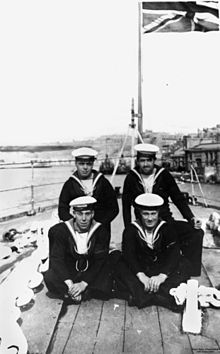Limey

The nickname Limey denotes on the one hand sailors of the British war and merchant navy, on the other hand as ethnophaulism "the British" or "the English " in general.
etymology
The term goes back to the 1795 order of the British Admiralty to distribute a ration of lemon juice daily to the crew of Royal Navy ships. This measure was intended to prevent the outbreak of scurvy and was subsequently taken to heart in the British merchant navy. In the 19th century came instead of lemon mostly lime juice ( English lime juice ) are used, although lime significantly less vitamin C contained as lemons and therefore as scurvy prophylactic are also less effective. 1844 became shipowners with the enactment of the Merchant Seamen's ActMandated by law to always carry lemon or lime juice with you on all trips overseas and to dispense it daily at the latest if salted instead of fresh provisions are served in the team fair for longer than 10 days . The wording of the provision (7 & 8 Vict. C. 112 p. 18) reads:

"And be it enacted, That every Ship navigating between the United Kingdom and any Place out of the same shall have and keep constantly on board a sufficient Supply of Medicines and Medicaments suitable to Accidents and Diseases arising on Sea Voyages, in accordance with the Scale which shall from Time to Time or at any Time be issued by the Lord High Admiral, or by the Commissioners for executing the Office of Lord High Admiral, and published in the London Gazette; and every Ship (except those bound to European Ports or to Ports in the Mediterranean Sea) shall also have on board a sufficient Quantity of Lime or Lemon Juice, Sugar, and Vinegar, the Lime or Lemon Juice, Sugar, and Vinegar to be served out to the Crew whenever they shall have been consuming salt Provisions for Ten Days; the Lime or Lemon Juice and Sugar daily, after the Rate of Half an Ounce each per Day, and the Vinegar weekly, at the Rate of Half a Pint per Week to each Person, so long as the Consumption of salt Provisions be continued; and in case any Default shall be made in providing and keeping such Medicines, Medicaments, and Lime or Lemon Juice, Sugar, and Vinegar, the Owner of the Ship shall incur a Penalty of Twenty Pounds for each and every Default; and in case of Default of serving out such Lime or Lemon Juice, Sugar, or Vinegar as aforesaid, the Master shall incur a Penalty of Five Pounds for each and every Default. "
Since quite a few shipowners neglected their duties and sailors were often served diluted or adulterated lime juice, the relevant regulations were tightened with the entry into force of the Merchant Shipping Act 1867; henceforth the juice stocks of incoming and outgoing ships in every customs port of the British Empire were inspected by a specially appointed official, the Inspector of Lime Juice .
By the time of the First World War at the latest, seafarers from other nations - especially sailors from the allied US Navy and the American merchant fleet - referred to ships that sailed under the British flag or their crews as lime-juicers or limeys for short . A little later, the word seeped from the sailor's language into the general American colloquial language and changed here over time to a slightly derisive term for "the British" or "the English" in general. Since then, the word has been used in both the narrower and the broader meaning alongside “ Tommy ” (originally a nickname for foot soldiers in the British Army ) in German. More recently, the incomparably coarser German disparage word "island monkey" is.
In the sense of "British, English", or rather in the sense of "British / English settler; Newcomer from the motherland ”, but at least without a nautical connotation, Limey was already used in Australian , New Zealand and South African English , ie in the most important colonies of the British Empire besides Canada . In Australia, Limey was in use in this sense, according to OED at the latest in 1888, lime-juicer in the sense of "newcomer" is already booked for 1859 here. At the same time as Limey was establishing itself as a term for British in American English , the word was falling out of use in Australia and New Zealand. Instead of this, the expression “ Pommy ” (often shortened to “Pom”) prevailed in order to abuse the British; it too goes back to a fruit, namely the pomegranate (English pomegrenate ).
See also
literature
- Entries Limey, n. And lime-juicer, n. In the Oxford English Dictionary , 2nd edition, Oxford University Press 1989.
- Christopher Lloyd : The Introduction of Lemon Juice as a Cure for Scurvy . In: Bulletin of the History of Medicine 35: 2, 1961, pp. 123-132.
Individual evidence
- ^ Christopher Lloyd: The Introduction of Lemon Juice as a Cure for Scurvy . In: Bulletin of the History of Medicine 35: 2, 1961, p. 131.
- ↑ 7 & 8 Vict. c. 112 ( 'An Act to amend and consolidate the Laws relating to Merchant Seamen; and for keeping a Register of Seamen' ), Section 18. Quoted after first publication in The Statutes of the United Kingdom of Great Britain, 7 & 8 Victoria, 1844 . Her Majesty's Printers, London 1844, pp. 856-857, online at < https://hdl.handle.net/2027/mdp.35112203948411?urlappend=%3Bseq=900 >
- ^ Christopher Lloyd: The Introduction of Lemon Juice as a Cure for Scurvy . In: Bulletin of the History of Medicine 35: 2, 1961, p. 132.
- ↑ Entries lime-juicer and limey in the Australian National Dictionary: A Dictionary of Australianisms on Historical Principles , Oxford University Press, Oxford 1988f., Online at < https://australiannationaldictionary.com.au/oupnewindex1.php# >
- ↑ entry Pommy the Australian National Dictionary: A Dictionary of Australianisms on Historical Principles ., Oxford University Press, Oxford 1988f, online at < https://australiannationaldictionary.com.au/oupnewindex1.php# >